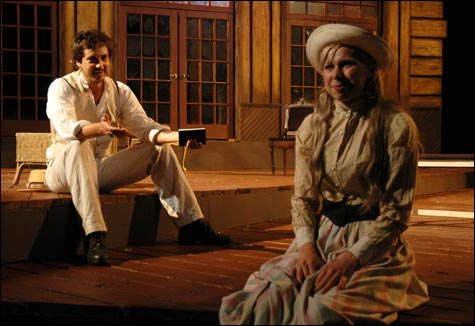
THE SEAGULL: The Publick production is as lively as the script — no Stanislavskian malaise. |
Chekhov wrote to a friend while composing The Seagull, first of his Big Four, that he was writing a “comedy with three female parts, six male parts, four acts, a landscape (a view of the lake), much talk about literature, and five tons of love.” Diego Arciniegas’s Publick Theatre production of his own new translation of the play (in repertory through September 7) doesn’t have a lake — it substitutes the nearby, conveniently glimpsed Charles River — but it sure supplies the five tons of love, throwing in a little lust for good measure. Set against the landscaped wilds of Christian Herter Park, it looks gorgeous. If Arciniegas’s text (he studied Russian in college and worked from his own literal translation) is sometimes jarringly contemporary given that the production hews to the play’s late-19th-century milieu, the cadences reflect the juxtaposition of passion and randomness one associates with Chekhov. And the staging ably balances the play’s angst and absurdity, making one wonder, once again, whether it wasn’t really Chekhov who invented the human.
Chekhov’s 1895 play about art, nature, and the inconvenience of the human heart works nicely in an al fresco setting. The opening two acts are set outdoors, the first of them in a makeshift summer theater where Nina, the girl-next-door with whom fledgling playwright Treplev is in love, performs her boyfriend’s abstract new work: a Symbolist evocation of a futuristic world devoid of living things. Treplev is an advocate of “new forms” in art, and sure enough, to judge by the snippet of monologue we hear before his bored-actress mother shoots down the effort, he’s a regular little Beckett.

But then, Arkadina, the mother to whom Treplev’s a regular little Hamlet, is an actress of the old school: vain, histrionic, self-centered, and charming. Between engagements, she’s summering at her brother Sorin’s country estate, where Treplev also lives. And she’s brought along her lover, the lightweight novelist Trigorin, of whom Treplev is both contemptuous and jealous. It is Trigorin who supplies the central metaphor when he turns Nina’s head. “Subject for a short story,” he jots down upon seeing a seagull Treplev has shot for no reason, then proceeds to pen a scenario in which a young girl lives by a lake, “free and happy as a gull,” until “one day a man comes along and, because he has nothing better to do, he destroys her.”
But The Seagull is a roundelay of unrequited love. Masha, farm manager Shamraev’s depressive daughter, burns for Treplev while hapless schoolteacher Medvedenko moons after her. Masha’s mother, Polina, begs her old flame, the physician Dorn, to run away with her. Meanwhile the boorish Shamraev reserves his fondness for antiquated actors whose performances he saw long ago. Even 60-year-old Sorin, who is dying, carries a torch for the life he never lived.
At the Publick, all this piquancy comes through loud and clear. Well, not loud — some of the actors, without becoming declamatory, need to speak up. Susanne Nitter, as inadequate if tender mom Arkadina, and Tyler Reilly, the excellent Treplev, both convey the petulant childishness that seems to be a family trait. Lynn Guerra brings a wiry savagery to Masha. And Joel Colodner exudes enough charm and empathy as Dorn that the character’s candor does not seem brutal. Robert Serrell, in his wire-rimmed glasses, is a more intellectual than dashing Trigorin; Hannah Wilson is a breathless Nina.
Arciniegas has said he penned his own translation in order to avoid the mustiness of some British ones. Indeed, his text is more vivid than noted Chekhov translator and Tufts professor Laurence Senelick’s drier transcription. There is a fair amount of American idiom and slang, but by and large, to judge by other translations, this one is pretty faithful, with a few crude steps over the line: Chekhov characters are not “pissed off,” and they do not say, “Bullshit.” As for the production, in which there is more than one embrace that starts as a lunge, it’s as lively as the script, exuding none of the Chekhov-frustrating malaise for which Stanislavsky’s stagings were famous. And Arciniegas, though he does not stint the play’s poignant comedy, takes a sharp, unambiguous turn at the end, underlining the truth that sometimes love’s wounds are more than a metaphor.
“There are no lives of quiet desperation in here,” insists John Wilkes Booth as the cadre of losers and misfits who make up the dramatis personae of Assassins converge on the Texas Book Depository at the end of Stephen Sondheim & John Weidman’s controversial musical about folks who have shot or tried to shoot the president. Ain’t that the truth? Company One’s revival of the show (at the BCA Plaza through August 9) is so consistently strident that the musical loses some of its sting. I am not among those who find this carnival treatment of the attention-seeking fanatics and fools who have turned the American Dream murderous to be in bad taste — or dangerous in the manner of Natural Born Killers. But I do think it should be executed, so to speak, with more finesse.